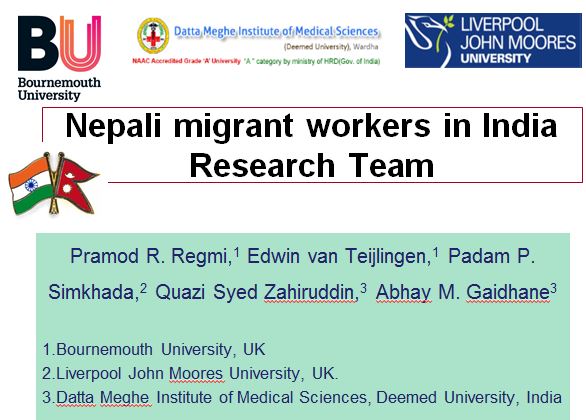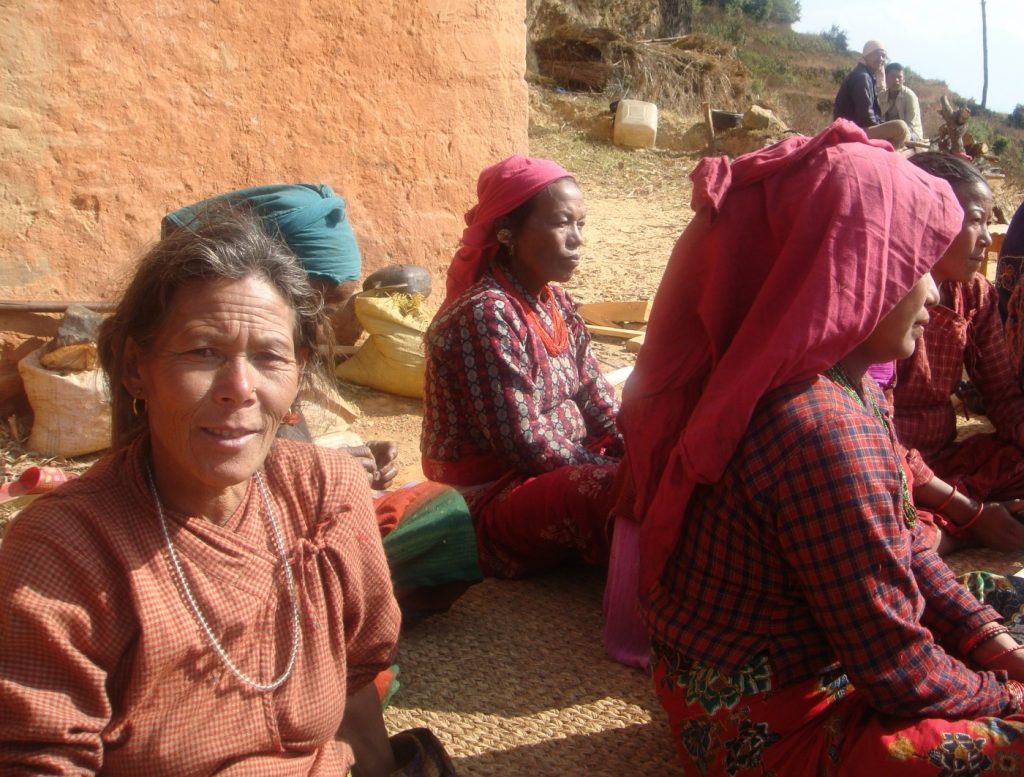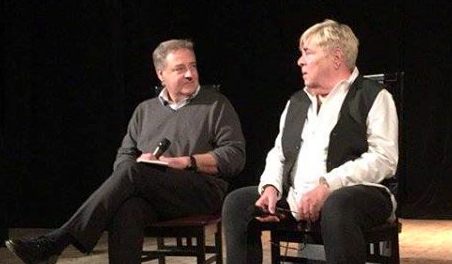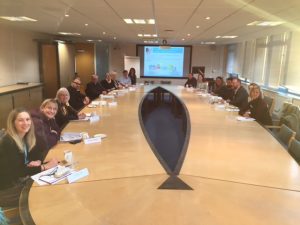 On the last day of BU’s Global Festival of Learning-India 2017 Prof. Edwin van Teijlingen presented the following paper: ‘Nepali migrant workers: trials & tribulations’. The Global Festival of Learning-India 2017 took place at Symbiosis School for Liberal Arts in Pune and at the India Habitat Centre in the capital Delhi. The session offered insight from various studies on Nepali migrant workers conducted by Bournemouth University staff and students.[1-3] It included preliminary results from an on-going study of Nepali migrant workers in India. The latter study is a close collaboration between Pramod Regmi and Edwin van Teijlingen) in the Faculty of Health & Social Sciences, Indian colleagues at Datta Meghe Institute of Medical Sciences, Deemed University in India (Quazi Syed Zahiruddin, Abhay M. Gaidhane), and Padam Simkhada at Liverpool John Moores University (LJMU).
On the last day of BU’s Global Festival of Learning-India 2017 Prof. Edwin van Teijlingen presented the following paper: ‘Nepali migrant workers: trials & tribulations’. The Global Festival of Learning-India 2017 took place at Symbiosis School for Liberal Arts in Pune and at the India Habitat Centre in the capital Delhi. The session offered insight from various studies on Nepali migrant workers conducted by Bournemouth University staff and students.[1-3] It included preliminary results from an on-going study of Nepali migrant workers in India. The latter study is a close collaboration between Pramod Regmi and Edwin van Teijlingen) in the Faculty of Health & Social Sciences, Indian colleagues at Datta Meghe Institute of Medical Sciences, Deemed University in India (Quazi Syed Zahiruddin, Abhay M. Gaidhane), and Padam Simkhada at Liverpool John Moores University (LJMU).
The presentation also highlighted some of the key findings form our recently published paper ‘Identifying the gaps in Nepalese migrant workers’ health and well-being: A review of the literature’ in the Journal of Travel Medicine.[1] The paper is co-authored by BU’s Pramod Regmi and Edwin van Teijlingen, and Padam Simkhada (LJMU) and our Nepali colleague Nirmal Aryal based in New Zealand.
 Dr. Shweta Sinda Deshpande, who chaired the session, originated from an Indian village a few miles from the Nepali border. Moreover, she is also an anthropologist who had done fieldwork with Nepali migrant workers in India. Her informed contribution was very much welcomed by the audience.
Dr. Shweta Sinda Deshpande, who chaired the session, originated from an Indian village a few miles from the Nepali border. Moreover, she is also an anthropologist who had done fieldwork with Nepali migrant workers in India. Her informed contribution was very much welcomed by the audience.
References:
- Simkhada, P.P., Regmi, P.R., van Teijlingen, E., Aryal, N. (2017) Identifying the gaps in Nepalese migrant workers’ health and well-being: A review of the literature, Journal of Travel Medicine 24(4): 1-9.
- Adhikary, P., Simkhada, P.P., van Teijlingen, E., Raja, AE. (2008) Health & Lifestyle of Nepalese Migrants in the UK BMC International Health & Human Rights 8(6). Web address: www.biomedcentral.com/1472-698X/8/6.
- Adhikary, P., Keen, S., van Teijlingen, E. (2011) Health Issues among Nepalese migrant workers in Middle East. Health Science Journal 5: 169-175. www.hsj.gr/volume5/issue3/532.pdf
- Aryal, N., Regmi, P.R., van Teijlingen, E., Simkhada, P., Adhikary, P., Bhatta, Y.K.D., Mann, S. (2016) Injury and Mortality in Young Nepalese Migrant Workers: A Call for Public Health Action. Asian-Pacific Journal of Public Health 28(8): 703-705.




 The ESRC Festival of Social Science will be back again this November (4th-11th), and we need researchers of Social Sciences to come and get involved in running lectures, workshops, exhibitions or other engagement platforms to share your research with the wider public.
The ESRC Festival of Social Science will be back again this November (4th-11th), and we need researchers of Social Sciences to come and get involved in running lectures, workshops, exhibitions or other engagement platforms to share your research with the wider public.



















 FHSS academics teaching in Nepal
FHSS academics teaching in Nepal New weight change BU paper
New weight change BU paper One week to go! | The 16th Annual Postgraduate Research Conference
One week to go! | The 16th Annual Postgraduate Research Conference Geography and Environmental Studies academics – would you like to get more involved in preparing our next REF submission?
Geography and Environmental Studies academics – would you like to get more involved in preparing our next REF submission? Congratulations to three former BU staff
Congratulations to three former BU staff MSCA Staff Exchanges 2024 Call – internal deadline
MSCA Staff Exchanges 2024 Call – internal deadline Applications are now open for 2025 ESRC Postdoctoral Fellowships!
Applications are now open for 2025 ESRC Postdoctoral Fellowships! Horizon Europe – ERC CoG and MSCA SE webinars
Horizon Europe – ERC CoG and MSCA SE webinars MaGMap: Mass Grave Mapping
MaGMap: Mass Grave Mapping ERC grants – series of webinars
ERC grants – series of webinars